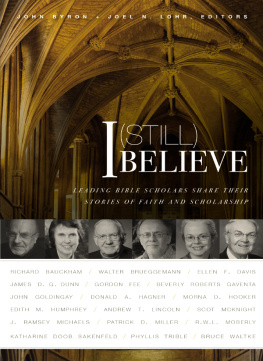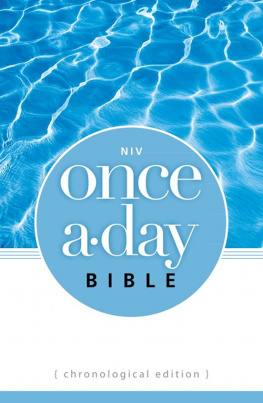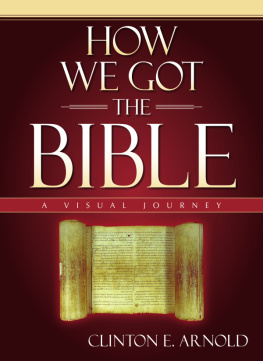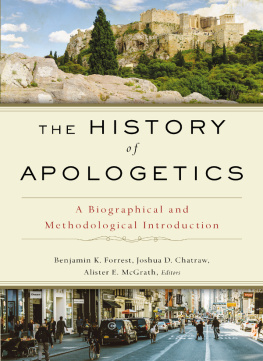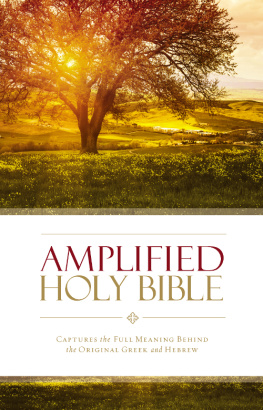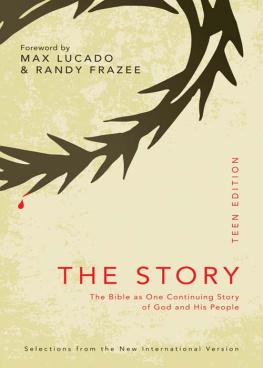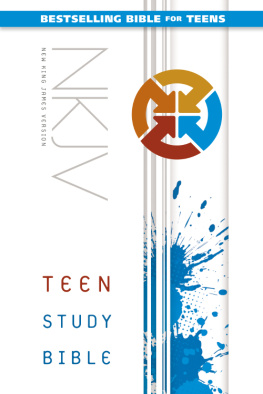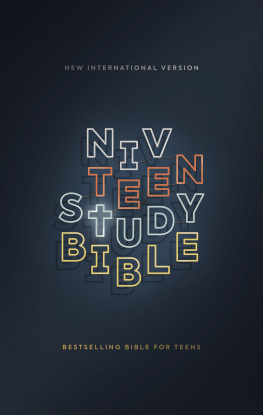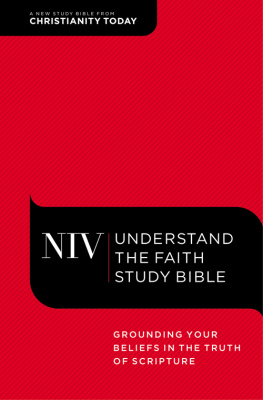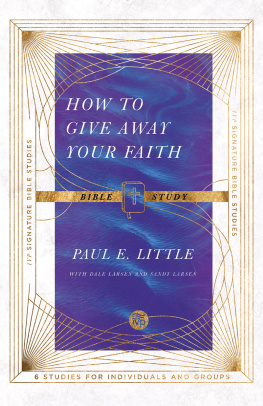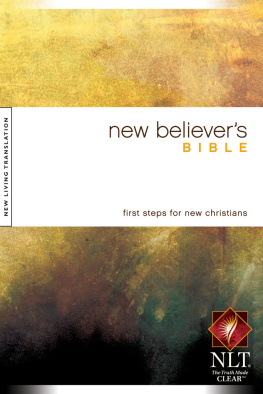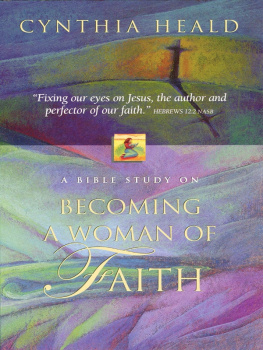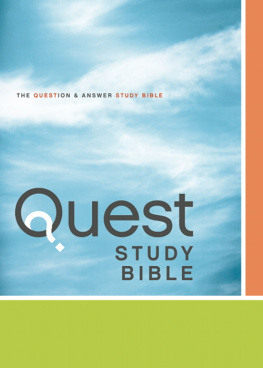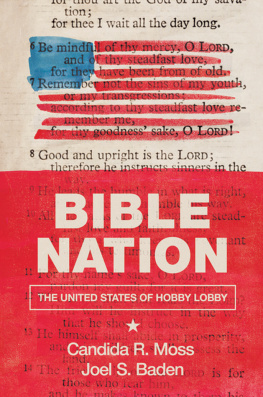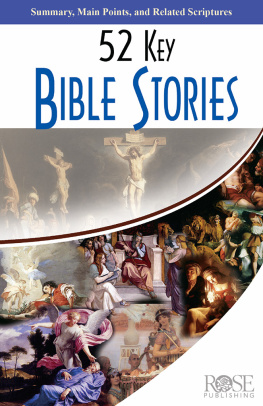ZONDERVAN
I (Still) Believe
Copyright 2015 by John Byron and Joel N. Lohr
ePub Edition July 2015: ISBN 978-0-310-51515-9
Requests for information should be addressed to:
Zondervan, 3900 Sparks Dr. SE, Grand Rapids, Michigan 49546
Library of Congress Cataloging-in-Publication Data
I (still) believe : leading Bible scholars share their stories of faith and scholarship / John Byron and Joel N. Lohr, editors.
pages cm
ISBN 978-0-310-51516-6 (softcover)
1. Biblical scholars. 2. Christian biography. I. Byron, John, 1967- joint editor.
BS501.A1I23 2015
220.092 dc23
2015006685
All Scripture translations, unless otherwise noted, are those of the various authors.
Any Internet addresses (websites, blogs, etc.) and telephone numbers in this book are offered as a resource. They are not intended in any way to be or imply an endorsement by Zondervan, nor does Zondervan vouch for the content of these sites and numbers for the life of this book.
All rights reserved. No part of this publication may be reproduced, stored in a retrieval system, or transmitted in any form or by any means electronic, mechanical, photocopy, recording, or any other except for brief quotations in printed reviews, without the prior permission of the publisher.
Cover design: Michelle Lenger
Cover photography: Getty Images
Interior design: Kait Lamphere
15 16 17 18 19 20 21 22 23 24 25 /DCI/ 20 19 18 17 16 15 14 13 12 11 10 9 8 7 6 5 4 3 2 1
For all who have struggled, wrestled, been discouraged, lamented, lost hope, wanted to give up, wondered if it all made sense, but still believe...
Contents
John Byron and Joel N. Lohr
Contributors
Richard Bauckham, Emeritus Professor of New Testament Studies, St. Andrews University; Senior Scholar, Ridley Hall, Cambridge
Walter Brueggemann, William Marcellus McPhidders Professor Emeritus of Old Testament, Columbia Theological Seminary
Ellen F. Davis, Amos Ragan Kearns Distinguished Professor of Bible and Practical Theology, The Divinity School, Duke University
James D. G. Dunn, Emeritus Lightfoot Professor of Divinity, Durham University
Gordon D. Fee, Professor Emeritus of New Testament, Regent College; formerly Professor at Gordon-Conwell Theological Seminary, Massachusetts
Beverly Roberts Gaventa, Distinguished Professor of New Testament, Baylor University; Helen H. P. Manson Professor of New Testament Literature and Exegesis Emerita, Princeton Theological Seminary
John Goldingay, David Allan Hubbard Professor of Old Testament, Fuller Theological Seminary
Donald A. Hagner, George Eldon Ladd Professor Emeritus of New Testament, Fuller Theological Seminary; Visiting Griset Chair in Bible and Christian Tradition, Chapman University
Morna D. Hooker, Lady Margarets Professor Emerita, University of Cambridge; Life Fellow, Robinson College, Cambridge
Edith Mary Humphrey, William F. Orr Professor of New Testament Studies, Pittsburgh Theological Seminary
Andrew T. Lincoln, Emeritus Professor of New Testament, University of Gloucestershire
Scot McKnight, Julius R. Mantey Professor of New Testament, Northern Seminary
J. Ramsey Michaels, Professor Emeritus of Religious Studies, Missouri State University, Springfield
Patrick D. Miller, Charles T. Haley Professor of Old Testament Theology Emeritus, Princeton Theological Seminary
R. W. L. (Walter) Moberly, Professor of Theology and Biblical Interpretation, Durham University
Katharine Doob Sakenfeld, William Albright Eisenberger Professor of Old Testament Emerita, Princeton Theological Seminary
Phyllis Trible, Baldwin Professor Emerita of Sacred Literature, Union Theological Seminary
Bruce Waltke, Professor Emeritus of Biblical Studies, Regent College; Distinguished Professor Emeritus of Old Testament, Knox Theological Seminary
Editors
John Byron, Professor of New Testament, Ashland Theological Seminary
Joel N. Lohr, Dean of Religious Life and Associate Professor of Practice, University of the Pacific
John Byron and Joel N. Lohr
I t had been on our minds for a long time. Like many students, our professors made quite an impression on us. Indeed, we recognized not only how our lives had been enriched as a result of our time with them in their writings, in the classroom, at seminars, tutorials, conferences, and so on but its probably safe to say that we became scholars ourselves because of them. When we became graduate students the relationships grew deeper and stronger, and their influence only intensified.
The more people we talked to, whether in church or the academy, the more we heard the same story, almost like a broken record: I became a scholar (or teacher, or pastor) because of my professor, Professor x. This, coupled with a love for autobiography (Joel having just read Stanley Hauerwas Hannahs Child and John, A Place at the Table, the biography of G.E. Ladd), got us talking late one evening about a need to put together a book like this a book of Bible professors autobiographies. We loved and admired our professors and wanted to learn more about them. We also knew that some of them were getting on in years and we didnt want their stories to be lost. We wanted to hear their life stories why they entered the field, why they do what they do, what makes them tick. We wanted to learn about their struggles, their pains, their sorrows, but also their joys, reasons for hope, and what brought them fulfillment in life. We knew there were stories to be told we had already caught glimpses of them in the classroom but we also suspected many of them would judge the idea of writing a complete autobiography too pompous, or self-indulgent, or even arrogant. Maybe a chapter would be more realistic. But then we wondered: Even if we could figure out a way to get a life story into a chapter, would we be able to round up a good roster of contributors? Could we pull it off? And would it end up being an odd, disparate collection of essays or could we find a way to unify them by way of a theme? What theme?
It turned out that the more we thought about the project the more things came together. The more we talked to people about it, people from all walks of life, the more these people and we got excited. Everyone thought it was a good idea. In fact, as a side note, we find it interesting that this project stands as the only one either of us have worked on in which virtually every invited contributor not only agreed to participate but everyone actually submitted their essays. No one had to withdraw. Ultimately, we got our dream team. And everyone (well, almost everyone!) submitted things on time. In truth, many contributors submitted their essays early. Remarkable. A book envisioned to contain fifteen essays ended up with eighteen as a result. What a wonderful problem to have. This speaks, we think, to the authors interest in the project but also something bigger. It speaks to its worth. And we think the authors enthusiasm for the project shows in the quality of the essays, as you will see. But, to return, there was still the question of theme in planning the book. How might we focus it? Was that necessary?
The more we talked about possible themes the more that of faith and scholarship came to the fore. In particular, we found ourselves talking again and again about how our own work as scholars of biblical literature affected our lives as people of faith. Conversely, we couldnt help but be reminded that our lives in the church and as people of faith did affect our scholarship, at least in terms of the areas we decided to research, our emphases, and what we took away from it. Further, given that we regularly encountered stories in popular books and other media of prominent Bible scholars who
Next page
